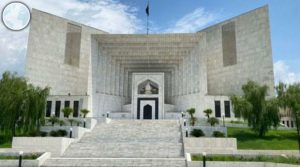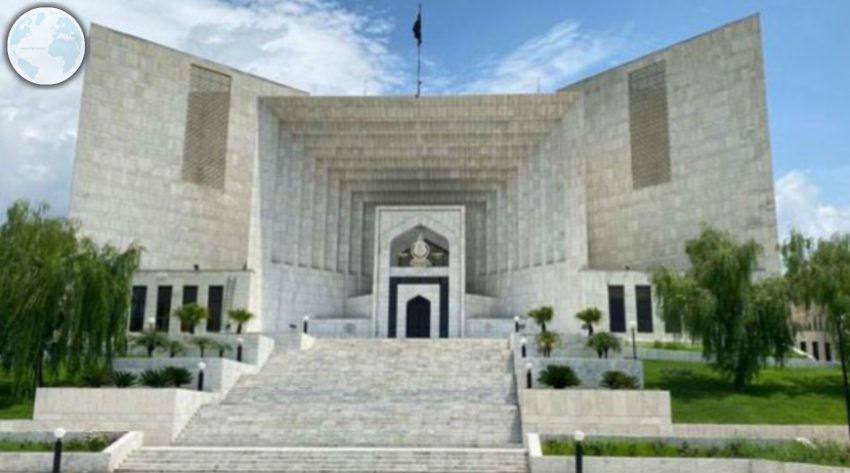The Supreme Court allowed the petitions opposed to the trial of civilians in Military Courts and declared the trial of civilians in military courts null and void.

The case opposed to the trial of civilians in military courts was heard by a 5-member larger bench headed by Justice Ijazul Ahsan, the bench includes Justice Muneeb Akhtar, Justice Yahya Afridi, Justice Mazhar Naqvi and Justice Ayesha Malik.
The trial of the civilian in the military courts has been declared null and void by the 5-member bench, however, Section 2 D One of the Army Act has been declared unconstitutional by 4 judges, while Justice Yahya reserved his opinion on it.
The court has declared that if the trial of a citizen has started in a military court, it is also declared null and void.
In the light of the incidents of May 9 and 10, 102 arrested persons whose list was presented in the court, the SCP has ordered to conduct their trial in the ordinary criminal courts.
The provisions of the Army Act which were presented before the COURT under which a civilian could be tried, the court also declared these provisions to be unconstitutional.
When the hearing started today, Justice Ejazul Hassan said that according to the last order, the arguments of the Attorney General were going on, after the arguments of the AG are completed, then he will see the procedure of conducting the case.
The petitioner’s lawyer, Salman Akram Raja, said that the trial in the military courts was started before the decision of the case.
The Justice Ijazul Hassan said that first let the Attorney General complete his arguments and then he will listen to everyone.
The AG Mansoor Usman Awan said in the arguments that he will inform why military courts were created through constitutional amendment in 2015, he will also tell the court why constitutional amendment is not necessary for military courts at this time.
The Justice Ijazul Hassan said that who were tried in the military courts of the past? Were the accused in 2015 civilians, foreigners or terrorists?
The AG Mansoor Usman Awan said that both local and foreign nationals were included in the accused, those who were tried in 2015 included terrorist facilitators, the accused will be tried under Section 2 One Day of the Official Secrets Act. , the question was asked that how will the charge be framed on the accused? The trial under the Army Act will fulfill all the requirements of a criminal trial, the trial of the May 9 accused will be in the style of a criminal court, the reasons will be given in the decision and the evidence will also be recorded, for a transparent trial under Article 10 A of the Constitution. All the requirements will be fulfilled, appeals can be made in the High Court and then in the SCP.
The Attorney General said that the 21st constitutional amendment was made because terrorists were not covered by the Army Act, the 21st constitutional amendment was made for the military trial of terrorists.
Justice Ijazul Hassan asked that the amendment was necessary for the trial of terrorists, so why not for civilians? Did the accused attack the army or the installations even at the time of the 21st constitutional amendment?
The Attorney General said the 21st Amendment included a provision for military trials of attackers in restricted areas.
Trial which was not accepted by military officers, how was it done by others? Justice Ijaz
Justice Ijazul Hassan asked how the trial which was not acceptable to military officers was done to others? The Attorney General said that the issue of bias was raised in the case of modification of military courts.
Justice Ijazul Hassan asked how civilians come under the ambit of the Army Act. Justice Ayesha Malik asked what Article 8 of the Constitution says, Mr. Attorney General?
The AG said that legislation opposed to fundamental rights cannot be sustained as per Article 8.
Justice Ayesha Malik said that the Army Act is for the establishment of discipline in the forces, how can the law of discipline in the forces be applied to civilians? How can the 21st Amendment be defended?
The AG said that the discipline of the forces is internal and obstructing the duties of the forces is an external matter, anyone who falls under this category can be tried in the military courts.
The Justice Ijazul Hassan said that the laws you are referring to are related to the discipline of the army. Justice Ayesha Malik said that the provision of fundamental rights can be left to the will of the Parliament. The Constitution ensures the provision of fundamental rights at all costs, how can army discipline and suspension of fundamental rights laws be applied to civilians? If the court opens this door, the person who breaks the traffic signal will also be deprived of his basic rights. Should we interpret the constitution that basic rights can be suspended whenever he wants?
The Attorney General said that courts martial are not courts established under Article 175. Justice Ijazul Hassan said that courts martial are not under Article 175 but are courts established under the constitution and law.
Court Martial is not under Article 175 but under High Court: Attorney General
Justice Yahya Afridi asked what is the difference between court and court martial? The Attorney General said that the court martial is a military court established under the Army Act, the court martial is not under Article 175 but is subordinate to the High Court, the decision of the military court can be challenged by a constitutional petition in the High Court.
Justice Yahya Afridi said that what will happen to the fair trial under Article 10A? The Attorney General said that due process was protected in the 21st Constitutional Amendment, the Army Act applies only when the offense is related to the Army, the Official Secrets Act can also apply to attacks on the Topi M House and the Foreign Office, Article 175.
The court returned the petitions of the accused in the custody of the army, Justice Ijazul Hassan said that there are no affidavits with the petitions of the persons in military custody. The applications of 9 accused in military custody were withdrawn.
After the arguments of the Attorney General were completed, the Supreme Court reserved its decision on the petitions related to the military courts, which have now been pronounced.
